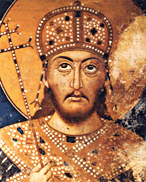 |
|
 |
Relations with Serbia and Bulgaria
 he increasing power of the Serbian state and the expansionist aspirations of the Serbian sovereign,
Stefan Decanski,
he increasing power of the Serbian state and the expansionist aspirations of the Serbian sovereign,
Stefan Decanski,
 against Byzantium was one of the primary issues of the foreign policy of
Andronikos III.
The Byzantine state was weakened as a result of the civil war between
Andronikos II
and Andronikos III, which had tormented the Empire from 1321 to 1328.
against Byzantium was one of the primary issues of the foreign policy of
Andronikos III.
The Byzantine state was weakened as a result of the civil war between
Andronikos II
and Andronikos III, which had tormented the Empire from 1321 to 1328.
To confront the Serbian danger, therefore, Andronikos III, who had emerged victorious from the internecine conflict, signed a treaty of alliance with the
Bulgars
(1328). However, before they had had time to act against the
Serbs
jointly, the Bulgars were defeated by the Serbs at the battle of Velbuzd in 1330. The Byzantines seized the opportunity to take a number of fortresses along the Byzantine-Bulgarian border, as well as the ports of Mesembria and Anchialos. These did not remain long in Byzantine hands, as the Bulgars recaptured the disputed ports and, by a treaty signed in 1332, secured their former borders with the Byzantine Empire.
 The victory of the Serbs at Velbuzd broke up the Bulgarian-Byzantine alliance and at the same time prepared the way for Serb expansion in the Balkans. In particular after
Stefan Dusan's
accession to the throne in 1331, the Serbs began to systematically expand, at the expense of Byzantium which, owing to the internal difficulties it faced, was unable to put up any opposition. It thus lost many of its strongholds in Macedonia, such as Ohrid, Prilapos, Kastoria, Stroumnitsa and Edessa. The assassination by a Byzantine officer of
Syrgiannes,
who, having defected from the Byzantine camp, had contributed decisively to the military successes of the Serbs, together with the
Hungarian
threat in the north of the Serbian state, prompted Dusan to accept the peace proposal offered by Byzantium. This treaty was signed in 1334 and, according to its terms, the Serbs kept the greatest part of their acquisitions in Macedonia, including the towns of Ohrid, Prilapos and Stroumnitsa. The victory of the Serbs at Velbuzd broke up the Bulgarian-Byzantine alliance and at the same time prepared the way for Serb expansion in the Balkans. In particular after
Stefan Dusan's
accession to the throne in 1331, the Serbs began to systematically expand, at the expense of Byzantium which, owing to the internal difficulties it faced, was unable to put up any opposition. It thus lost many of its strongholds in Macedonia, such as Ohrid, Prilapos, Kastoria, Stroumnitsa and Edessa. The assassination by a Byzantine officer of
Syrgiannes,
who, having defected from the Byzantine camp, had contributed decisively to the military successes of the Serbs, together with the
Hungarian
threat in the north of the Serbian state, prompted Dusan to accept the peace proposal offered by Byzantium. This treaty was signed in 1334 and, according to its terms, the Serbs kept the greatest part of their acquisitions in Macedonia, including the towns of Ohrid, Prilapos and Stroumnitsa.
|